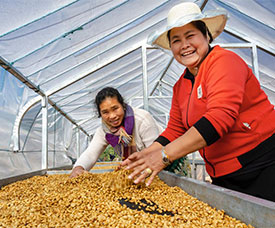Bolstering a green and inclusive economy in the coffee and tea sector
Coffee and tea, undeniably, are universally popular drinks enjoyed and celebrated in many cultures.
More than 2 billion cups of coffee are consumed every day worldwide, generating a turnover of around US$200 billion each year.
 |
| Young women collect tea leaves. |
A total of 5 billion cups of tea are consumed worldwide each day, and the global tea market was estimated to be worth US$51.6 billion in 2023.
In Laos, coffee and tea are more than just popular drinks. They also tell the success story behind the long-standing cooperation between France and Laos, generating income for farmers and improving their livelihoods.
There’s a fascinating journey behind the Lao coffee and tea that fills your cup! From the south to the north of Laos, you are welcomed by a dizzying array of coffee shops serving local and international tea and coffee products.
While coffee was introduced by the French in the 19th century, northern Laos is home to an endemic tea variety, known as “Camellia Sinensis”.
This evergreen is highly sought after and appreciated for its quality and can be found in single stemmed trees up to 20 metres tall in Lao forests.
Recognising the value of coffee and tea’s contribution to the country’s economic growth, the Lao government and development partners have been working together for the last decade to improve production, quality, and market access for Lao coffee and tea.
Today, coffee and tea contribute to the economic development of Laos with an export value of nearly US$200 million annually, making Lao the 34th and 63rd world exporters of coffee and tea, respectively.
The way forward: At a time when promising new markets are emerging thanks to a fast-growing global demand for “premium” Arabica coffee and “higher-quality” tea, Lao producers and local stakeholders must fully leverage their competitiveness.
 |
| Coffee beans laid out to dry in a greenhouse. |
From the volcanic plateau of Bolaven in the south to the misty mountains of northern Laos, each terroir has its own unique geology, climate and ecosystem that produces high-quality coffee and tea to meet global market trends.
However, coffee and tea still face challenges on the way to becoming profitable businesses.
There are delays in sector consolidation, threats to resources as a result of recurring climate change events and the booming of cash crops, varying quality and productivity, a lack of reliable operators and governance, fluctuating income along the value chain due to unpredictable market prices, and a lack of regulation of trade practices.
Additionally, a shortage of skilled workers has hindered the full realisation of the industry’s potential.
The Green CUP Project is one of two flagship projects under the umbrella of the “Global Gateway Team Europe Partnership with Laos to increase sustainable and inclusive Trade, Investment and Connectivity in the Agriculture and Forestry sectors - TICAF programme” launched on March 14, 2024.
Green CUP seeks to bolster trade and investment in the green economy for the coffee and tea sectors through agro-ecological community-based action, climate-resilient and inclusive value chains, and access to sustainable and high-value markets, notably European markets.
By Advertorial Desk
(Latest Update March 27, 2024)
|



